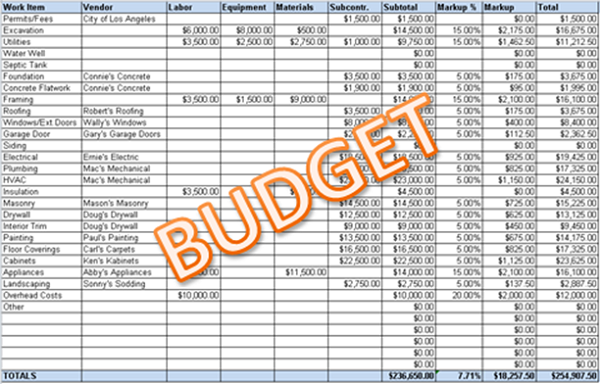For a first-time builder, the primary reason for budgeting is that it’s a way of assessing the total cost of a proposed project to see the possibility of its implementation and whether or not you can afford to go ahead with it.
There is an easy and straightforward way to prepare a building construction budget. The first thing to consider when preparing a budget plan is to determine how much you can afford comfortably without ‘breaking your back’. For most people, this will be the amount of the total funds saved or money raised from the sale of an existing asset such as a home, and the total amount you can afford to get from financial lenders.
Building Financial Schemes
While preparing the building costs budget, it is good to know that there are numerous financial schemes available that are tailored to building extensions, restorations, renovations and erection of new buildings.
To have a complete and workable budget, you need to talk to lenders offering these schemes to know what they offer. You’ll need to ask them to carefully explain how the lending scheme works, and to tell you how much they are ready to lend you.
When you have a good idea of the amount you can raise towards your project, you’ll know what you can afford for the project and can proceed with preparing detailed budget plans.

First Time Builder – How to Work Out a Simple Budget Plan
Preparing a budgeting plan for building construction works is quite similar to planning a budget for any other task. There are a number of costs that must be taken into consideration. Nevertheless, the total number is limited. It is easier to work it out if you break all costs into subgroups, for example:
- Professional fees
- Materials
- Labour
- Insurance, etc…
……and into subdivisions of related costs, for example:
Professional fees
a) Architect’s fees
b) Structural engineer fees (if required)
c) The solicitor’s fees, etc…
Materials
a) Timber
b) Masonry materials
c) Roofing materials, etc…
Labour (for skilled workers)
a) Plumber
b) Electrician
c) Carpenter, etc…
Budgeting this simple and straightforward way makes it much easier to account for all the costs that will be incurred and in order to be organised and avoid confusion, work on separate sheets of paper (or an excel spreadsheet if you are using a computer) for each group and their subgroups.
Keeping an Account of Costs
As a first-time builder, you must not forget to keep detailed accounts of those costs which will have to be met immediately, such as material purchases or deposits etc… Do this by asking about payment and other necessary terms whilst asking for such quotations.
With such planning and detailed information which will prove invaluable, when you are implementing your budget planning details, you’ll be able to assess and subsequently account for the amount of cash flow you are going to need to meet all costs during the duration of the project.
Detailed planning and budgeting sensibly for your building project will go a long way in ensuring its success.
Related:
Tips for First-Time Home Builders – Know This Before You Build
9 Golden Rules for Project Managers in the Building Construction Industry
